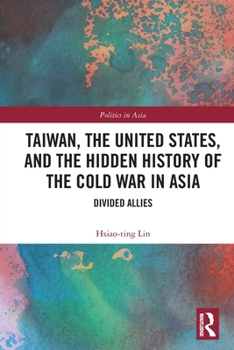Taiwan, the United States, and the Hidden History of the Cold War in Asia: Divided Allies
Select Format
Select Condition 
Book Overview
This book explores the challenges which faced the United States and Taiwanese alliance during the Cold War, addressing a wide range of events and influences of the period between the 1950s and 1970s.
Tackling seven main topics to outline the fluctuations of the U.S.-Taiwan relationship, this volume highlights the impact of the mainland counteroffensive, the offshore islands, Tibet, Taiwan's secret operations in Asia, Taiwan's Soviet and nuclear gambits, Chinese representation in the United Nations, and the Vietnam War. Utilizing multinational archival research, particularly the newly available materials from Taiwan and the United States, to reevaluate Taiwan's foreign policy during the Cold War, revealing a pragmatic and opportunistic foreign policy disguised in nationalistic rhetoric. Moreover, this study represents a departure from previous scholarship, emphasizing the dictatorial and incompetent nature of the Chinese Nationalist regime, to provide fresh insights into the nature of U.S.-Taiwan relations.
Presenting a revisionist view of one of the strongest bilateral relationships of the Cold War, this will be an insightful resource for scholars and students of Chinese and East Asia History, Cold War History, Asian Studies, and International Relations.





